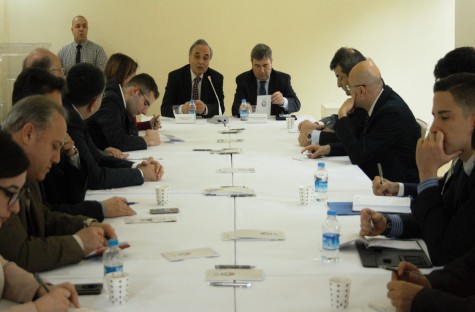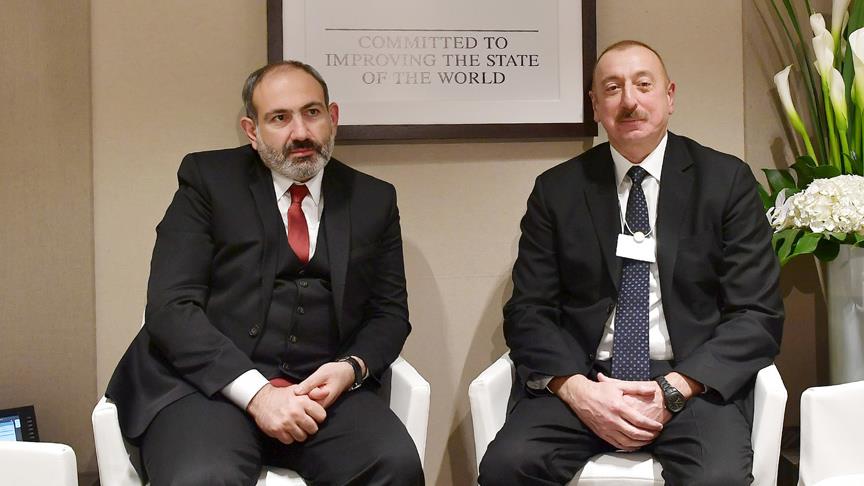As will be remembered by the article published in the AVIM bulletin entitled “Azerbaijan-Armenia Relations at the 18’th Year of the Ceasefire”, the co-chair of the Minsk Group met with the foreign ministers of Azerbaijan and Armenia on 27 October in France and in the press conference following the talks, it was indicated that the Co-chair would visit the region in the second half of November.
Through the statements made by the foreign ministries of Azerbaijan and Armenia, it was confirmed that the Minsk Group Co-chair would visit Yerevan on November 23rd and Baku on November 26. It is expected for the Co-chair of the Minsk group to share their views and impressions with the other ten members, including Turkey, which form the Minsk group and to present their reports during the annual OSCE Ministerial Council meeting to convene in Dublin, Ireland on 6-7 December.
Azerbaijan wants the Armenian forces to withdraw from Nagorno-Karabakh and the surrounding seven regions occupied by military force whereby Azerbaijani population was forced to relocate and to regain its territorial integrity. On the other side, Armenia, from the very beginning, has aimed for this problem to be frozen and has viewed the Minsk Group’s duty as maintaining the status quo. The Azerbaijani side finds the work of the Minsk Group Co-chair for the resolution of the conflict to be insufficient and does not hide its impatience to reach a settlement. However, for the ongoing seventeen years the Armenians have not criticized the Co-chair of the Minsk Group in any way and have not accused them of being inactive or inadequate.
Institutional voice from the international community has come from the Organization of the Islamic Conference (OIC) which has 57 members. In the recent 39th session the OIC Council of Foreign Ministers held in Djibouti, Armenia’s policy of occupation and annexation has been condemned and Armenia has been called to withdraw its troops from the occupied Azerbaijani territories as soon as possible.
Turkey has always attached importance and prominence to peace and stability in the neighboring Caucasian region. The situation which Azerbaijan, with whom Turkey has close relations, has been subjected to makes the issue more sensitive and one of priority. The “Caucasian Stability and Cooperation Platform” proposed by Turkey is still on the table. Turkey is also part of a trilateral process with another one of its neighboring countries Iran together with Azerbaijan. Following their meetings in Urmia and Nakhchivan, it is expected for the foreign ministers of the three countries to come together for a third round next week in Erzurum.
It is anticipated that with their visit to the region and the report they will submit to the OSCE Ministerial Council, the Minsk Grop Co-chair will introduce new and concrete proposals to open the door to bring about a solution. Should a fresh opening to expectations for a settlement fail and the problem continue to remain frozen, it will be prudent for the OSCE, in order to give a new chance to peaceful resolution, to review its mandate for the Minsk Group enabling it to address the problem in full capacity of the group, and for Turkey to be able to play an active and balancing role to contribute to the resolution of the conflict based on its geographical and political vantage point.
© 2009-2025 Center for Eurasian Studies (AVİM) All Rights Reserved
THE UNSTEADY SOUTHERN CAUCASUS
 A HUMBLE REMINDER TO THE SECRETARY GENERAL OF NATO IN VIEW OF THE MOTION ADOPTED BY THE GERMAN PARLIAMENT
A HUMBLE REMINDER TO THE SECRETARY GENERAL OF NATO IN VIEW OF THE MOTION ADOPTED BY THE GERMAN PARLIAMENT
 EMMANUEL MACRON RECEIVED A SURPRISE NEW YEAR “GIFT” IN EXCHANGE FOR HIS SUPPORT TO ARMENIAN CLAIMS
EMMANUEL MACRON RECEIVED A SURPRISE NEW YEAR “GIFT” IN EXCHANGE FOR HIS SUPPORT TO ARMENIAN CLAIMS
 AVİM HELD A CONFERENCE ON MONGOLIA’S POTENTIAL IN THE REGION, THE CURRENT SITUATION IN MONGOLIA PRIOR TO THE 11TH ASIA-EUROPE MEETING (ASEM) AND TURKISH-MONGOLIAN RELATIONS
AVİM HELD A CONFERENCE ON MONGOLIA’S POTENTIAL IN THE REGION, THE CURRENT SITUATION IN MONGOLIA PRIOR TO THE 11TH ASIA-EUROPE MEETING (ASEM) AND TURKISH-MONGOLIAN RELATIONS
 THE ARMENIAN REVOLUTIONARY FEDERATION’S EMBRACE OF TERRORISM
THE ARMENIAN REVOLUTIONARY FEDERATION’S EMBRACE OF TERRORISM
 AZERBAIJAN-ARMENIA PEACE NEEDS STRATEGIC OUTLOOK AND PRAGMATIC STEPS
AZERBAIJAN-ARMENIA PEACE NEEDS STRATEGIC OUTLOOK AND PRAGMATIC STEPS




























